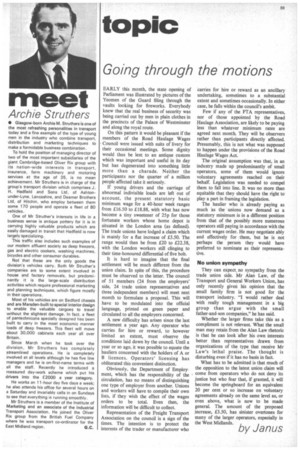topic
Page 57

If you've noticed an error in this article please click here to report it so we can fix it.
Going through the motions
EARLY this month, the state opening of Parliament was illustrated by pictures of the
Yeomen of the Guard filing through the vaults looking for fireworks. Everybody knew that the real business of security was being carried out by men in plain clothes in the precincts of the Palace of Westminster and along the royal route.
On this pattern it would be pleasant if the members of the Road Haulage Wages Council were issued with suits of livery for their occasional meetings. Some dignity would thus be lent to an antique custom which was important and useful in its day but has degenerated into something little more than a charade. Neither the participants nor the quarter of a million people affected take it seriously.
If young drivers and the carriage of abnormal indivisible loads are left out of account, the present statutory basic minimum wage for a 40-hour week ranges from £16.50 to £18.88. with what has now become a tiny sweetener of 25p for those fortunate workers whose home depot is situated in the London area (as defined).
The trade unions have lodged a claim which is mainly for a fiat increase of £3.50. The range would then be from £20 to £22.38, with the London workers still clinging to their time-honoured differential of five bob.
It is hard to imagine that the final settlement will be much different from the union claim. In spite of' this, the procedure must be observed to the letter. The council of 51 members (24 from the employers' side. 24 trade union representatives and three independent members) will meet next month to formulate a proposal. This will have to be modulated into the official language, printed on green paper and circulated to all the employers concerned.
A new difficulty has arisen since the last settlement a year ago. Any operator who carries for hire or reward, to however limited an extent, must observe the conditions laid down by the council. Until a year or so ago, it was possible to equate the hauliers concerned with the holders of A or B licences. Operators' licensing has obliterated this convenient distinction.
Obviously, the Department of Employment, which has the responsibility of the circulation, has no means of distinguishing one type of employer from another. Unions and workers will have to compile their own lists, if they wish the effect of the wages orders to be total. Even then, the information will be difficult to collect.
Representation of the Freight Transport Association on the council is a sign of the times. The intention is to protect the interests of the trader or manufacturer who carries for hire or reward as an ancillary undertaking. sometimes to a substantial extent and sometimes occasionally. In either case, he falls within the council's ambit, Few if any of the FTA representatives, nor of those appointed by the Road Haulage Association, are likely to be paying less than whatever minimum rates are agreed next month. They will be observers rather than participants directly affected. Presumably, this is not what was supposed to happen under the provisions of the Road Haulage Wages Act.
The original assumption was that, in an industry made up predominantly of small operators, some of them would ignore voluntary agreements reached on their behalf. Legislation was needed to compel them to fall into line. It was no more than equitable that they should have the right to play a part in framing the legislation.
The haulier who is already paying as much as the unions now demand as a statutory minimum is in a different position from that of the possibly more numerous operators still paying in accordance with the current wages order. He may negotiate ably and effectively for them, but he is not perhaps the person they would have preferred to nominate as their representative.
No union sympathy They can expect, no sympathy from the trade union side. Mr Alan Law, of the Transport and General Workers Union, has only recently given his opinion that the small family firm is not good for the transport industry. "I would rather deal with really tough management in a big group than argue with the small father-and-son companies," he has said.
Whether the larger firms take this as a compliment is not relevant. What the small man may retain from the Alan Law rhetoric is that he can look after his own interests better than representatives drawn from organizations of the type that receive Mr Law's lethal praise. The thought is disturbing even if it has no basis in fact.
What has to be admitted is that much of the opposition to the latest union claim will come from operators who do not deny its justice but who fear that, if granted, it will become the springboard for an equivalent 20 per cent or so increase on voluntary agreements already on the same level as, or even above, what is now to be made general. The amount of the proposed increase, £3.50, has sinister overtones for many of the larger operators, especially in
the West Midlands. by Janus




















































































































